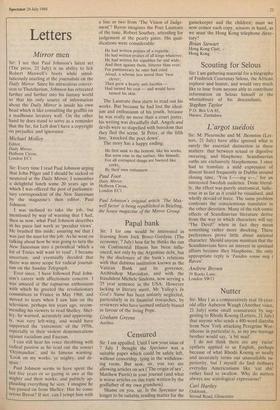Sir: Every time I read Paul Johnson urging that John
Pilger and I should be sacked or neutered at the Daily Mirror, I remember a delightful lunch some 20 years ago in which I was offered the post of parliamen- tary correspondent of the New Statesman by the magazine's then editor, Paul Johnson.
I was inclined to take the job, but mentioned by way of warning that I had, then as now, what Paul Johnson describes in his piece last week as 'peculiar views'. He brushed this aside, assuring me that I was just the man for the job. As he went on talking about how he was going to turn the New Statesman into a periodical 'which a lot of Tories will want to read', I became uncertain, and eventually decided that there was more scope for radical journal- ism on the Sunday Telegraph.
Ever since, I have followed Paul John- son's career with affectionate concern. I was amazed at the rapturous enthusiasm with which he greeted the revolutionary committees in France in May 1968, and moved to tears when I saw him on the television, perhaps ten years ago, recom- mending his viewers to read Shelley. Shel- ley, he warned, accurately and approving- ly, was very left-wing, and would have supported the 'extremists' of the 1970s, especially in their violent demonstrations against racialism and Fascism.
I can still hear his voice throbbing with radical passion as he read out the sonnet 'Ozymandias', and its famous warning: 'Look on my works, ye mighty, and de- spair.'
Paul Johnson seems to have spent the last five years or so gazing in awe at the mighty and their works. and publicly ap- plauding everything he sees. I imagine he has passed on from Shelley. Has he come across Byron? If not, can I tempt him with a line or two from 'The Vision of Judge- ment'? Byron imagines the Poet Laureate of the time, Robert Southey, attending for judgement at the pearly gates. His qual- ifications were considerable:
He had written praises of a regicide; He had written praises of all kings whatever; He had written for republics far and wide; And then against them, bitterer than ever; For pantisocracy he once had cried Aloud, a scheme less moral than 'twas clever; Then grew a hearty anti-Jacobin - Had turned his coat — and would have turned his skin.
The Laureate then starts to read out his works. But because he had lost the ideal- ism and enthusiasm of his youth, because he was really no more than a court jester, his writing was dreadfully dull. Angels and devils were so stupefied with boredom that they fled the scene. St Peter, at the fifth line, 'knocked the poet down'.
The story has a happy ending:
He first sank to the bottom, like his works, But soon rose to the surface, like himself; For all corrupted things are buoyed like corks, By their own rottenness . . .
Paul Foot
Daily Mirror, Holborn Circus, London EC I
Paul Johnson's original article 'The Max- well factor' is being republished in Briefing, the house magazine of the Mirror Group.










































 Previous page
Previous page